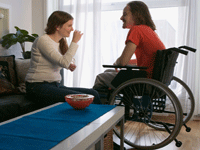
Planned housing benefit reforms threaten the independence of disabled people, say charities and housing providers.
A coalition of 37 bodies is warning that many disabled people may be forced to leave supported housing settings for residential care or to return to their families as a result.
Consultation on the proposals closes on Sunday.
The plans would overhaul the system of “exempt accommodation”, under which housing benefit meets the full cost of specialist social housing for vulnerable groups. This is typically much higher than benefits paid out to meet mainstream housing rents because of additional staffing and management costs.
The Department for Work and Pensions is proposing to limit payments for people with lower-level support needs in homeless hostels, domestic violence refuges and sheltered housing for older people to the level of local housing allowance – the housing benefit paid to private tenants – plus a fixed sum.
Those who need more intensive support to live independently in the community and hence more expensive accommodation, such as people with learning disabilities, could receive more assistance after application to the local authority, though funding for this would also be limited. Although the DWP said it wanted the changes to be cost-neutral, it was proposing to control the rising costs of exempt accommodation benefits.
In its consultation response, Mencap warned the reforms would make it more difficult for providers to maintain or invest in specialist housing as more people with learning disabilities wanted to live independently.
It said the current “right” to higher housing benefit for specialist housing would be eroded by giving councils a limited pot with which to fund payments, which could itself be raided if the money was not ring-fenced.
“This will mean that individuals will either be moved back into institutions miles away from their friends and families, or that families will be the ones picking up the pieces,” said David Congdon, Mencap’s head of campaigns and policy.
A similar fate could befall people with autism in this form of housing, warned Sarah Lambert, head of policy at the National Autistic Society.
The two organisations were among 37 charities and housing providers to sign up to a statement of principles on reform. This emphasised that entitlement to the higher levels of housing benefit should be retained, funding should meet providers’ full costs and that existing tenants should not be put at risk of losing their homes.
In its response, supported housing umbrella body Sitra said the proposals “placed in jeopardy the homes and the wellbeing of thousands of highly vulnerable people to many of whom no local authority accepts it has a statutory duty”. It said it did not believe a distinction could be made between lower-level and more specialist supported housing on which to base different levels of benefit.
Homeless Link also attacked the proposals, saying that, amid increasing costs for specialist housing providers and cuts in Supporting People funding, there was “simply no capacity to have funding reduced and continue to provide a service at current levels”.
What do you think? Join the debate on CareSpace
Keep up to date with the latest developments in social care. Sign up to our daily and weekly emails
Related articles
Cuts ‘could deny independence’ to learning disabled people
10-point guide to housing benefit changes and what they mean for social care


 Bournemouth, Christchurch and Poole
Bournemouth, Christchurch and Poole  Hampshire County Council
Hampshire County Council  Lincolnshire County Council
Lincolnshire County Council  Norfolk County Council
Norfolk County Council  Northamptonshire Children’s Trust
Northamptonshire Children’s Trust  South Gloucestershire Council
South Gloucestershire Council  Wiltshire Council
Wiltshire Council  Wokingham Borough Council
Wokingham Borough Council  Children and young people with SEND are ‘valued and prioritised’ in Wiltshire, find inspectors
Children and young people with SEND are ‘valued and prioritised’ in Wiltshire, find inspectors  How specialist refugee teams benefit young people and social workers
How specialist refugee teams benefit young people and social workers  Podcast: returning to social work after becoming a first-time parent
Podcast: returning to social work after becoming a first-time parent  Podcast: would you work for an inadequate-rated service?
Podcast: would you work for an inadequate-rated service?  Family help: one local authority’s experience of the model
Family help: one local authority’s experience of the model  Workforce Insights – showcasing a selection of the sector’s top recruiters
Workforce Insights – showcasing a selection of the sector’s top recruiters 

 Facebook
Facebook X
X LinkedIn
LinkedIn Instagram
Instagram
Comments are closed.